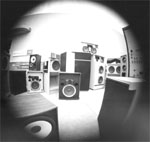Having seen that many contributors to the forum value the use of a charged couple crossover network. I wondered if there are any measurements to back up these assertions? Maybe I haven't searched hard enough, but I can't find any science on this site to explain it? With many members having the technical knowledge and possibly the necessary measuring equipment, would it be possible to conduct a null test to determine if there is any measurable difference between the audio passing through a single capacitor,( Xuf ) and two connected in series, (2Xuf) with an electrical charge applied to the junction?



 Reply With Quote
Reply With Quote





